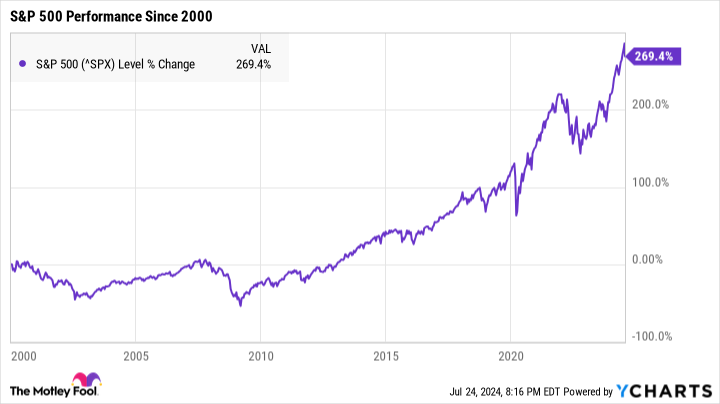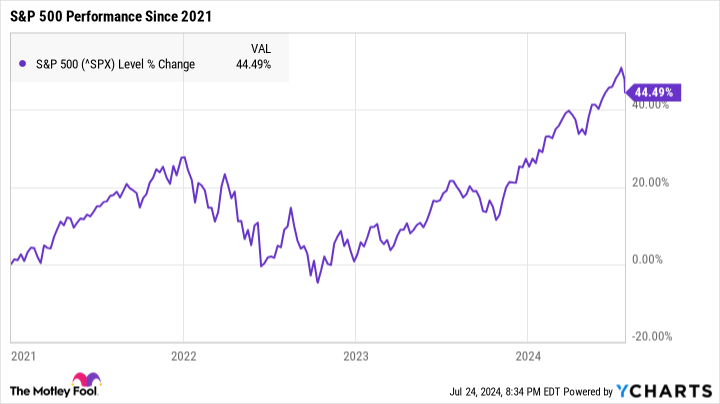Experts Are Warning About a Stock Market Crash. Here’s What History Has to Say About It.
The stock market has been on fire over the past couple of years, and many investors have watched their portfolios soar. The S&P 500 (SNPINDEX: ^GSPC) is up by more than 52% since it bottomed out in October 2022, while the tech-heavy Nasdaq (NASDAQINDEX: ^IXIC) has surged by nearly 67% in that time.
But these gains can’t last forever, and there’s no shortage of experts predicting what the next market downturn might look like. Economist Harry Dent recently said in an interview with Fox Business that the market is currently in the “bubble of all bubbles.” And research firm Capital Economics predicts that the S&P 500 could face a correction after reaching the 6,500 mark, which analysts expect might happen by the end of 2025.
Many have compared this market surge — which has been heavily fueled by excitement around artificial intelligence (AI) technology — to the dot-com bubble of the early 2000s. That downturn ended up becoming the longest bear market in the S&P 500’s history, and investors are understandably nervous about a similar slump in the near future.
But what does all this really mean for your investments? While all downturns and bubbles are different, here’s what history says about times like these — and how to maximize your long-term earnings amid market uncertainty.
What history says about market downturns
There’s good and not-so-good news about the future of the stock market. The not-so-good news is that it’s impossible to predict exactly what the market will do. While experts may make big claims about when the next downturn will begin or how severe it might be, nobody can say for certain what will happen.
All that uncertainty can be daunting, especially if you’re trying to figure out what to do with your investments. The good news, though, is that history shows that the market is incredibly predictable over the long haul.
The stock market has a 100% success rate when it comes to recovering from downturns, and since nothing is guaranteed when investing, that’s a pretty remarkable track record.
In the past two-and-a-half decades alone, the market has experienced some of the worst slumps in history — including the record-breaking bear market following the dot-com bubble burst, the Great Recession in 2008, the COVID-19 crash in 2020, and the most recent downturn throughout 2022. Despite everything, though, the S&P 500 is still up by more than 269% since 2000.
If history shows us anything about downturns, it’s that no matter how severe, they’re always temporary. Rather than trying to predict when the next one will hit or how long it will last, it’s often better to simply ride out the storm and wait for the inevitable recovery.
What to do with your investments right now
In times of uncertainty, it’s normal to want to be proactive with your portfolio. Many investors may be eager to time the market and buy or sell stocks depending on when the next correction begins.
While that may sound smart in theory, it’s nearly impossible to pull off in practice. Because the market is so unpredictable in the short term, you risk buying or selling at the wrong time and locking in costly losses.
For example, countless economic forecasters have predicted over the last few years that the U.S. will enter a recession. So far, that has yet to happen. But since 2021 alone, the S&P 500 has soared by more than 44%. If you had stopped investing for fear of a recession, you’d have missed out on significant stock market gains.
No matter what’s in store for the market over the short term, its long-term potential is outstanding. To minimize risk and maximize your earnings, it’s wise to stay in the market for as long as possible — even throughout the tough times.
The key, though, is to ensure you’re investing in the right places. Your portfolio is far more likely to recover from corrections and experience long-term growth if it’s filled with healthy stocks from solid companies.
If you haven’t already, right now is the perfect opportunity to do a deep dive into your investments and double-check that each stock deserves a place in your portfolio. If all your stocks are from companies with strong fundamentals, there’s a much better chance they will survive even a severe market downturn.
Nobody knows what the stock market’s short-term future holds, but if history shows us anything, it’s that its long-term potential is incredibly promising. By investing in the right places and keeping a long-term outlook, what happens in the coming days, weeks, or months won’t matter as much.
Should you invest $1,000 in S&P 500 Index right now?
Before you buy stock in S&P 500 Index, consider this:
The Motley Fool Stock Advisor analyst team just identified what they believe are the 10 best stocks for investors to buy now… and S&P 500 Index wasn’t one of them. The 10 stocks that made the cut could produce monster returns in the coming years.
Consider when Nvidia made this list on April 15, 2005… if you invested $1,000 at the time of our recommendation, you’d have $692,784!*
Stock Advisor provides investors with an easy-to-follow blueprint for success, including guidance on building a portfolio, regular updates from analysts, and two new stock picks each month. The Stock Advisor service has more than quadrupled the return of S&P 500 since 2002*.
*Stock Advisor returns as of July 22, 2024
Katie Brockman has no position in any of the stocks mentioned. The Motley Fool has no position in any of the stocks mentioned. The Motley Fool has a disclosure policy.
Experts Are Warning About a Stock Market Crash. Here’s What History Has to Say About It. was originally published by The Motley Fool







